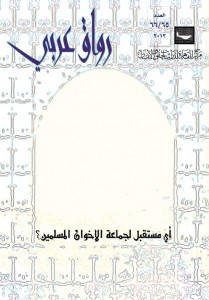 What is the future of the Muslim Brotherhood after the ouster of Mohammed Morsi? This is the question raised by the challenges which have followed the swift downfall of the Brotherhood’s rule. The answer is yet to be seen: the Brotherhood may turn to violence and abandon peaceful, democratic politics, or the organization may choose to be again incorporated into the political scene based on new political arrangements. Both of these options pose challenges to the group and must be considered in light of changing political and security circumstances in Egypt and the region.
What is the future of the Muslim Brotherhood after the ouster of Mohammed Morsi? This is the question raised by the challenges which have followed the swift downfall of the Brotherhood’s rule. The answer is yet to be seen: the Brotherhood may turn to violence and abandon peaceful, democratic politics, or the organization may choose to be again incorporated into the political scene based on new political arrangements. Both of these options pose challenges to the group and must be considered in light of changing political and security circumstances in Egypt and the region.
In considering this question, the Cairo Institute for Human Rights Studies (CIHRS) recently released a new issue of Rowaq Arabi titled “What Future for the Muslim Brotherhood?” A group of Arab writers of various political and intellectual persuasions contributed to this issue, no. 65/66, offering different perspectives on and responses to this central question.
Amr Shobki offers a reading of the intellectual and organizational commonalities of Islamist currents and their receptiveness to the idea of democracy. Khalil al-Anani discusses the future of the Brotherhood between marginalization and conditional assimilation. Ahmed Abd Rabbo looks at three possible scenarios for the future of the group, while Ammar Ali Hassan examines two different choices facing the Brotherhood in the future.
Hazem Saghiyah focuses on the need to consider the organization’s future in light of the future of the general political order in Egypt, shedding light on the need to link these two. This question is also taken up by Ali Mabruk in his contribution, “The Future of the Muslim Brotherhood and the Future of Egypt.”
In the same issue, Salah al-Din al-Gorshi and Ibrahim al-Hodeibi offer different perspectives on the political rise of the Brotherhood after January 25 and the main causes of the group’s rapid downfall.
Finally, Radwan Ziada and Mohammed Hossam Fadel give a broader view that encompasses the entire region, raising questions about the future of democracy in the Arab world as a whole in light of the exclusion of political Islam and looking at various examples of the rise and development of the Islamist current in “Arab Spring” countries.
Rowaq Arabi is a publication which has been issued by CIHRS for more than 15 years, yielding more than 60 issues. It is primarily a research journal based on studies, analyses, debates, and documents, with contributions from select researchers from various Arab countries.
You can pick up a copy of Rowaq Arabi from the CIHRS office in Bab al-Louq or read the journal online here.
Share this Post

